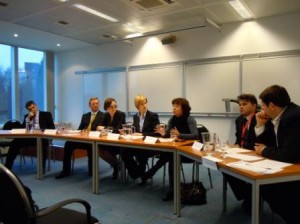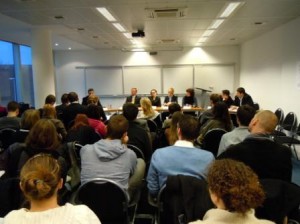On Monday, the 22nd of November, 2010, the University of Kent – Brussels School of International Studies (BSIS) convened an EU-Russia Panel on Energy. Invited guests shared their respective expertise from a variety of perspectives following their participation in a conference earlier in the day that commemorated the 10 year anniversary of Energy Policy Dialogue between Moscow and Brussels.
The panel served two functions for the audience and participants. First, it was an opportunity for the guests to reflect upon the conference earlier in the day and second, the audience was encouraged to participate by asking questions. As a result, the audience left the panel discussion with several strong impressions. However, it was apparent for all the guests that in order for Russia to provide the EU with a stable energy supply, a solidified relationship with Ukraine will be necessary.
All of the panelists universally agreed that the question of Ukraine’s relationship to the EU-Russia dialogue was dependent upon trust, transparency and accountability. Ultimately, success for Ukraine would depend upon the government’s ability to upgrade its financial state and keep politics outside of the energy industry. Ukraine remains caught between its simultaneous need for both energy security and modernization, which are both costly investments that are crucial for the country’s development prospects. While Ukraine does not directly participate in the EU-Russia dialogue on energy, the panelists agreed that its relevance to the dialogue is indisputable.
In addition, any potential Ukraine-EU dialogue or Russia-Ukraine dialogue on energy must not exclude the third party involved. Ms. Tatiana Mitrova, from the Energy Research Institute of the Russian Academy of Sciences, claimed that previous EU-Ukraine energy mechanisms politely ignored and even excluded Russia. From Moscow’s perspective, this was extremely shortsighted given that the transit of natural gas through Ukraine to the EU remains equally important for Russia. This has resulted in a game of political posturing between the EU and Russia over gas transportation and influence over Ukraine. As such, disagreement regarding the energy trade, particularly with respect to natural gas, remains an undeniable reality at three different levels: at the level of the EU, Russia and Ukraine. Each of these stakeholders command a unique position within the energy trade, which guarantees significant complexities within their relationship as consumers, suppliers and transitors of energy respectively.
The question of a regulatory framework for the three way energy trade between the EU, Ukraine and Russia was deemed by panelists as a significant challenge for all parties. This was not in the least due to the fact that Ukraine is the biggest consumer of Russian natural gas as well as the key transit territory for EU-bound gas from Russia. A common set of legal rules underscoring this three-way energy trade does not yet exist, although there are presently efforts to integrate Ukraine into EU’s nascent internal market energy legislation through the Energy Community Treaty. Ukraine is a recent signatory to this Brussels-driven regulatory initiative. Ukraine’s membership to the Treaty was seen by panelists as a means of helping Kiev attract investment in order to modernize its domestic energy infrastructure, thus improving the country’s gas transit capacity and helping to work towards a more solid relationship between Ukraine, the EU and Russia. Alexey Kuropyatnik, Senior Counselor for the Permanent Representation of Ukraine to the European Community, strongly advocated his country’s capabilities and attempts in Ukraine to modernize profitably. He also questioned why no dialogue exists between the EU and its other key partners in the energy trade, such as Qatar, Algeria or Norway. From his perspective, the only purpose for the Energy Policy Dialogue was to serve political interests. Furthermore, he posited that “only when the EU-Russia Dialogue dies will business return to normal, becoming negotiated between private companies and not the politicians.”
The complications created by distinct interests and agendas for political and private stakeholders in the EU Russia Energy Dialogue were also discussed in relation to the possibility for future harmonization of the energy policies of the EU with those of Russia. Yuri Lavrov, of Lukoil Belgium, demonstrated that West European and Russian corporations have already created strategic partnerships to work together. That being said, he added that “harmonization (between the EU and Russia) doesn’t work and is not realistic.” The existing relationship is a product of the parties’ respective positions in the energy trade. Indeed, the panel split on the topic of how much gas Russia should produce in order to meet EU requirements. While some argue that the EU and Russia must find a common field for a vision of future harmonization, not all agreed that this would be best achievable through forecasting supply and demand.
Although some panelists agreed that improved harmonization of forecasting would help create greater stability in the energy trade, the abundance of different forecasts presently available only complicates this possibility. Mr. Lavrov also pointed towards the need for greater compatibility between legislation of the EU and that of Russia as a prerequisite for any possible harmonization of EU and Russian energy policies. Although some panelists stressed that a harmonization of forecasts could stabilize the market and promote investment, many agreed that a difference in legislation was likely to remain, thus undermining investment prospects. Instead, Mr. Lavrov suggested that greater integration or the development of a “strategic partnership” would be more realistic. In reflecting upon the EU-Russia Energy Dialogue, he stressed that a great disappointment, from the Russian perspective, was the fact that none of the EU speakers from that morning’s high level conference proposed any strategies for increased integration with Russia.
In response to a question from the audience, the panelists reacted to a point raised as to whether green energy strategies were emerging as a competitor to Russian energy exports to the EU. In response, the panel seemed divided in respecting Europe’s right to pursue green energies with the more conventional outlook that Russian energy imports would remain the most economically viable option for European countries. Mr. Lavrov offered a bold prediction by stating that in 2050 the energy sources of greatest consumption would be 1) natural gas, 2) nuclear, 3) crude oil, 4) renewables, and 5) coal. He maintained that “1 kilowatt of renewable energy remains five times more expensive” to produce. Ms. Mitrova, revealed that in Russia, the most optimistic target for renewable energy, as a percentage of the nation’s total energy produced, would be 4% of all energy sources by 2030. As such, any “competition” that renewable energies might appear to create would not be felt in the Russian domestic energy market. Other panelists stated that green energy was not a key question for the EU-Russia Energy Dialogue, and while it remained an important consideration for future cooperation and technological advancement, the main problem concerned its large-scale implementation. Energy efficiency was ultimately most important because any transition or improvement in the energy sector must remain economically viable.


